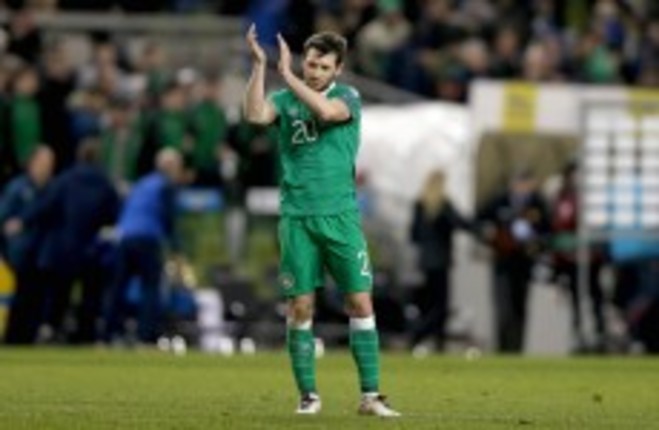POLAND COACH ADAM Nawalka conceded after last night’s match at the Aviva Stadium that a draw was a fair result.
And Nawalka cited one area of the encounter in particular where his side were below par: “We lost control of the midfield as the game progressed,” he told reporters afterwards.
It was a notable admission because it is something that — unless the team are minnows such as Gibraltar — you almost never hear the opposition manager saying after a game at the Aviva Stadium nowadays.
Before last night, when was the last time you watched a competitive Ireland match against semi-decent opposition where the Boys in Green were markedly superior in midfield for a sustained period? There are surely very few examples in the post-Roy Keane-playing era at least.
And surely it is no coincidence that the team’s excellence in this department coincided with a rare start for Wes Hoolahan in a competitive fixture, even if James McCarthy also deserves some credit, as the Everton player’s prominence increased as the game progressed.
The Norwich man tends to be a divisive figure among Ireland watchers, with skeptics suggesting that the more he is left out of the team, the better the player he seems to become.
And granted, last night’s performance was by no means flawless. The 32-year-old midfielder gave the ball away cheaply at times and his influence lessened in the second half as tiredness set in, but he kept going, and even headed the ball into Shane Long’s path for Ireland’s decisive equaliser late on.
However, despite those caveats, the ex-Shels player did more than enough to suggest his long-term advocates had a right to feel aggrieved by his lack of game time until now.
Particularly in the first half, Hoolahan regularly dictated the tempo of the play. Every time he got the ball, the sense of excitement and anticipation in the crowd was palpable, and Seamus Coleman should have done better with one especially well-executed through ball from his teammate, which split the Polish defence wide open.
Quite simply, Hoolahan — who along with Robbie Keane was the only non-Premier League player to start for the hosts — made Ireland tick and compensated to a large degree for the lack of finesse elsewhere in the side.
Up until now, the Norwich man has invariably caught the eye in friendlies and other low-key matches (i.e. Gibraltar). But to take the responsibility to continually show for the ball and try to make things happen in last night’s crunch fixture proves he has what it takes to succeed at international level — something his detractors have doubted largely on account of his problems at club level in recent seasons.
Yet despite the presence of Bayern Munich’s Robert Lewandowski and several other highly talented footballers on the pitch, Hoolahan — a player who struggled to get a game for Championship Norwich until recently — looked as good as anyone on the night.
https://vine.co/v/OLMqQHMljIj
Before the match, the Polish side talked up Ireland’s fight and determination, noting their proclivity for long balls. And while the country’s stereotypical footballing traits were evident to a degree, especially when desperate times called for desperate measures late on, it would be no surprise if the Poles left the Aviva Stadium yesterday with their perception of Irish football slightly altered.
After all, the initial two-man attack of Hoolahan and Robbie Keane was hardly the perfect basis for a classic long-ball game, and this was reflected by Ireland’s determination to play it to feet more often than not last night.
Of course, O’Neill’s men ended up with several attackers on the pitch and adopted an increasingly direct approach, which ultimately proved successful, but this doesn’t mean the idea of a passing game should be abandoned altogether in future qualifiers. On the contrary, it is doubtful the later approach would have proved so successful if the team’s earlier efforts hadn’t worn the visitors down to a great degree.
Long’s last-gasp goal therefore ensures the Irish side will retain a sense of hope as they prepare to host Scotland in their next qualifier on 13 June, and the Southampton striker must now be expecting to start in light of his brief but telling contribution last night.
The same can’t be said for Robbie Keane though, as the Irish legend again struggled with the isolation prompted by the lone frontman role.
Consequently, a Long-Hoolahan combo could be the way forward in future, with the former possessing the pace that Keane lacks to stretch defences and run on to his teammate’s defence-splitting through balls.
Norwich are now reaping the rewards after offering the Dubliner regular football, and O’Neill — who previously hinted the diminutive midfielder would be used only in home games — must surely follow suit.
With little to lose and wins desperately needed as the campaign approaches its climax, Ireland can no longer afford to ignore a player of Hoolahan’s attacking talents, as they had done largely until last night.
– First published 06.20

